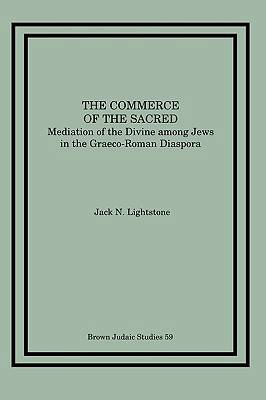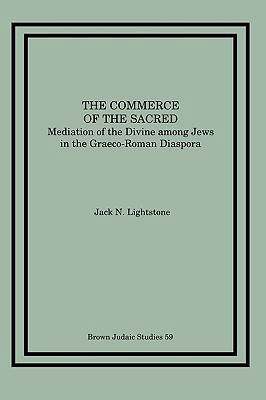
- Afhalen na 1 uur in een winkel met voorraad
- Gratis thuislevering in België vanaf € 30
- Ruim aanbod met 7 miljoen producten
- Afhalen na 1 uur in een winkel met voorraad
- Gratis thuislevering in België vanaf € 30
- Ruim aanbod met 7 miljoen producten
Zoeken
The Commerce of the Sacred
Mediation of the Divine among Jews in the Graeco-Roman Diaspora
Jack N Lightstone
€ 20,95
+ 41 punten
Omschrijving
Jack Lightstone's "Commerce of the Sacred" remains an original and influential contribution to Judaic studies. Lightstone offers critical perspectives on the practices and beliefs of Greco-Roman Jews who lived outside of Palestine and beyond rabbinic control or influence. He investigates their influence on early Christians and examines how the two communities defined themselves in relation to each another. He challenges the view of Judaism as a single set of practices and beliefs and argues that Jews of the Greco-Roman Diaspora did not retain a shared, biblical "perception of the world" centered on the Jerusalem temple. Rather, they believed multiple points of contact between God and man could be made through particular rites: prayer in the presence of the sacred scrolls, pleas for help at the tombs of dead saints and martyrs, and the interventions of holy men with alleged supernatural powers, to name a few. Many early Christians also participated in this Judaic "commerce of the sacred," blurring the social and religious boundaries that distinguished Jews and Christians.
Lightstone innovatively combines approaches from the history of religions and social anthropology to provide a different picture of Judaism during this period. Featuring a new foreword and an updated bibliography, "Commerce of the Sacred" resituates the Jews in the Greco-Roman world.
Specificaties
Betrokkenen
- Auteur(s):
- Uitgeverij:
Inhoud
- Aantal bladzijden:
- 236
- Taal:
- Engels
- Reeks:
- Reeksnummer:
- nr. 59
Eigenschappen
- Productcode (EAN):
- 9780891306641
- Verschijningsdatum:
- 1/01/1984
- Uitvoering:
- Paperback
- Formaat:
- Trade paperback (VS)
- Afmetingen:
- 152 mm x 229 mm
- Gewicht:
- 349 g

Alleen bij Standaard Boekhandel
+ 41 punten op je klantenkaart van Standaard Boekhandel
Beoordelingen
We publiceren alleen reviews die voldoen aan de voorwaarden voor reviews. Bekijk onze voorwaarden voor reviews.











